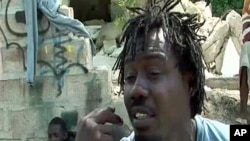Children and teenagers make up 45 percent of Haiti's population. Many have been traumatized by January's earthquake. Some have lost parents or relatives who were their only means of support. The lucky ones find care and shelter from others. But, many end up on the streets, fending for themselves and adding to Haiti's already sizeable population of street children.
The song is called Kids Carnival, a rap about surviving on the streets. The artists are these street children from Port au Prince.
Each day, about 30 kids - the rappers among them - gather at the home of the man who helped them record it, 32-year-old Jimmy Bonhomme. He's a former street kid himself, and he provides the one meal these kids have each day.
"It is a passion of mine, a mission for me," said Jimmy Bonhomme. "It's like God talked to me and told me to do this."
Before January's earthquake, there were 10,000 street children in Port au Prince, according to a UN estimate. That number is expected to rise in the aftermath of the quake. Most street children spend their days begging for money and food.
Reverend Joseph Constant has worked with Haitian street kids for years. He says their lives are full of misery and despair.
"They will either die on the street because no one really cares - no one cares about these children," he said. "So they are going to die or they are going to use them through trafficking. And usually they are abused sexually or they are a part of the crime wave."
Bonhomme knows the problems these kids face. When he was on the streets, he was jailed seven times. Often, he says, for crimes he did not commit.
As an adult, he has dedicated his life to protecting street kids.
"Sometimes you have good moments, sometimes you have bad moments too," he said. "But not having anyone to defend your rights, that was the main reason that I decided to defend others."
The meal he provides everyday is conditional. If the kids want to eat, they must attend school with Bonhomme every morning, from 7 until 10.
The neighborhood has given him a small building where he stores benches and donated supplies.
The first thing he teaches the kids is how to write their names. In a country with a 50-percent literacy rate, this is no small accomplishment.
"If I am still alive, I want to make sure they get something good in society, a doctor or a lawyer. If I am still alive," said Jimmy Bonhomme.
After school, the kids go out to beg. They give some of that money back so Bonhomme can buy food
The support he provides is not lost on the children. David Camille told us he lived with his grandmother until she died. Then, he was forced onto the streets. He has been shot at by gangs and hit by a car. Papa, as he calls Bonhomme, provides the only stability in his life.
"Papa has been doing a lot for us," said David Camille. "He gives us most everything we need. Even some times he gets mad at us when we do things he doesn't like. But that doesn't prevent him from loving us and giving us what we need."
Nothing goes to waste, down to the burnt pasta at the bottom of the pot. Then, a scramble for the last morsels.
Officials say it's impossible to know how many more children were forced into the streets by the earthquake.
These children told us they do not want to live in a government run orphanage. They prefer the freedom and comfort Papa provides.
January Earthquake Displaces Many Haitian Children
- By Jeff Swicord




